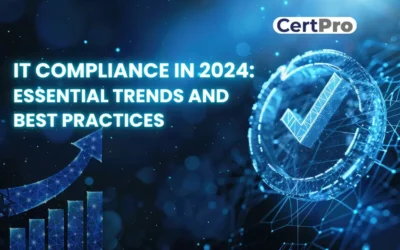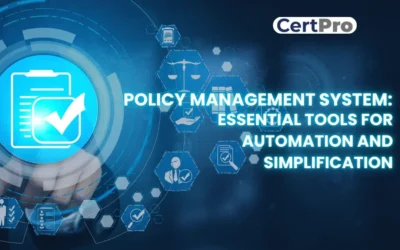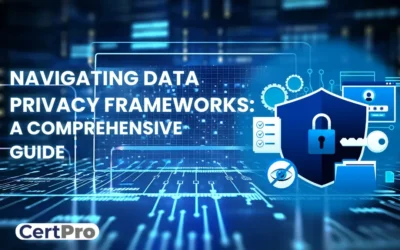PIPEDA
Personal Information Protection and Electronic Documents Act
In today’s world, technology connects us all and crosses geographical boundaries. Every online action collects personal information, which maximizes the internet’s potential. However, cybercriminals pose a significant threat, so ensuring data security is crucial. This is where PIPEDA helps. The Personal Information Protection and Electronic Documents Act (PIPEDA) is a Canadian federal law that controls how organizations collect and use personal information. PIPEDA applies to many sectors, including private companies, non-profits, and federal organizations involved in commerce.
Compliance with PIPEDA is vital. Consequently, it protects individuals’ privacy rights and builds trust between people and organizations. However, non-compliance can lead to penalties and harm an organization’s reputation. Moreover, a PIPEDA compliance certificate shows a commitment to data protection and reassures clients about the safety of their information.

CERTIFICATION AND AUDITING SERVICES BY CERTPRO FOR PIPEDA
CertPro provides affordable PIPEDA compliance solutions worldwide. We grasp the need to balance costs with regulations. Our personalized method ensures you pay only for essential services. Accordingly, this quickens compliance, avoiding business interruptions. With our affordable pricing and efficient processes, CertPro makes PIPEDA compliance accessible without compromising audit quality. Therefore, trust CertPro to help you achieve PIPEDA compliance within your budget.
WHY CHOOSE CERTPRO FOR PIPEDA CERTIFICATION AND AUDITING?
CertPro is the best choice for PIPEDA certification and auditing for various convincing reasons. As a result, our knowledgeable staff will provide personalized guidance as you navigate the problematic certification procedure. Furthermore, we strictly adhere to data security and regulatory rules while prioritizing your business requirements. Moreover, CertPro’s track record of success can help you build credibility, lower risks, and show that you are a committed and responsible leader in the industry regarding safeguarding customer data.
| Factors | CertPro Advantage |
|---|---|
| Time to Certification | 4x faster than traditional approaches |
| Price | Competitive rates with flexible options |
| Process | Streamlined and efficient methodology |
| Expertise | 10+ years of industry experience |
CERTPRO’S COST-EFFECTIVE APPROACH TO PIPEDA CERTIFICATION
CertPro offers an affordable solution for PIPEDA compliance. Therefore, we understand the challenges and customize our services. However, our auditors focus on your specific needs. This streamlines the process and reduces costs. Consequently, CertPro safeguards client data confidentiality. Stay competitive and achieve compliance goals. Manage finances responsibly with CertPro.
| No. of employees | Timeline | Cost (approx.) |
| 1 – 25 | 4 weeks | 2500 USD |
| 25-100 | 6 weeks | 3500 USD |
| 100-250 | 6-8 weeks | 5000 USD |
| 250 plus | 8 weeks | Custom plans |
UNDERSTANDING THE PERSONAL INFORMATION PROTECTION AND ELECTRONIC DOCUMENTS ACT (PIPEDA)
PIPEDA is Canada’s federal privacy law. However, it was enacted on April 13, 2000. However, this law fosters trust and safeguards data privacy. Initially, the scope of electronic commerce grew. Now, it covers banking, broadcasting, and healthcare. PIPEDA governs personal information handling. It respects privacy while allowing reasonable information use. It applies to many entities. This includes private companies, non-profits, and federal organizations. Personal information is broadly defined. It includes names, addresses, emails, phone numbers, and birthdates. It also covers social insurance numbers, financial data, and medical information.
THE PRINCIPLES OF PIPEDA
PIPEDA has some exemptions, so it might not apply if a province has similar laws. Therefore, it also exempts information for journalism, art, or literature. Employee information used only for work purposes is also exempt. Organizations must check if PIPEDA applies to them and ensure compliance.
The fair information principles form PIPEDA’s foundation. The schedule contains ten principles that guide personal information protection and management.
-
- Accountability: Organizations are accountable for personal information. They must designate responsible individuals. Furthermore, this includes data sent to third-party vendors.
- Identifying Purposes: Organizations identify the reason for collecting personal information. They do this before or at the time of collection.
- Consent: Collecting, using, or disclosing personal information needs consent. However, this is unless consent is inappropriate.
- Limiting Collection: Organizations collect only necessary information. They use fair and lawful means for this.
- Limiting Use, Disclosure, and Retention: Information is used only for its original purpose, which requires individual consent or legal necessity. Additionally, organizations keep data only as long as necessary.
- Accuracy: Personal information must be accurate. It should also be complete and up-to-date.
- Safeguards: Organizations protect personal information. They use security measures suitable for data sensitivity.
- Openness: Organizations provide transparent information about data policies. They explain personal information management practices.
- Individual Access: Organizations provide information about data use and disclosure upon request. Individuals can access and challenge this information and request amendments if necessary.
- Challenging Compliance: Individuals can raise compliance concerns. They address these to the responsible individuals.
These principles ensure information is handled responsibly. They maintain trust and protect privacy.

PIPEDA: PRIVACY RIGHTS
The privacy rights of individuals are essential in data protection. PIPEDA follows these rights closely. Therefore, here are some key points:
Right to be Informed: Organizations must inform people why they process their data. This can be done orally or in writing. PIPEDA does not explicitly call this the right to be informed.
Right to Access: People can access information on how their data is used. Organizations must respond within 30 days. The response should be free or at a minimal cost.
Right to Correction: People can ask organizations to fix wrong data. Corrections should also be sent to any third parties involved.
Right to Withdraw Consent: People can withdraw their consent at any time. However, organizations may keep data for as long as needed to fulfill their purpose.
Right to Erasure: The OPC says people can delete their online information. Some believe PIPEDA covers this under the right to withdraw consent.
Right to Lodge a Complaint: People who think an organization has violated PIPEDA can complain to the OPC.
Organizations under PIPEDA must include these rights in their privacy notices. They should explain how to use these rights and verify identity for requests.
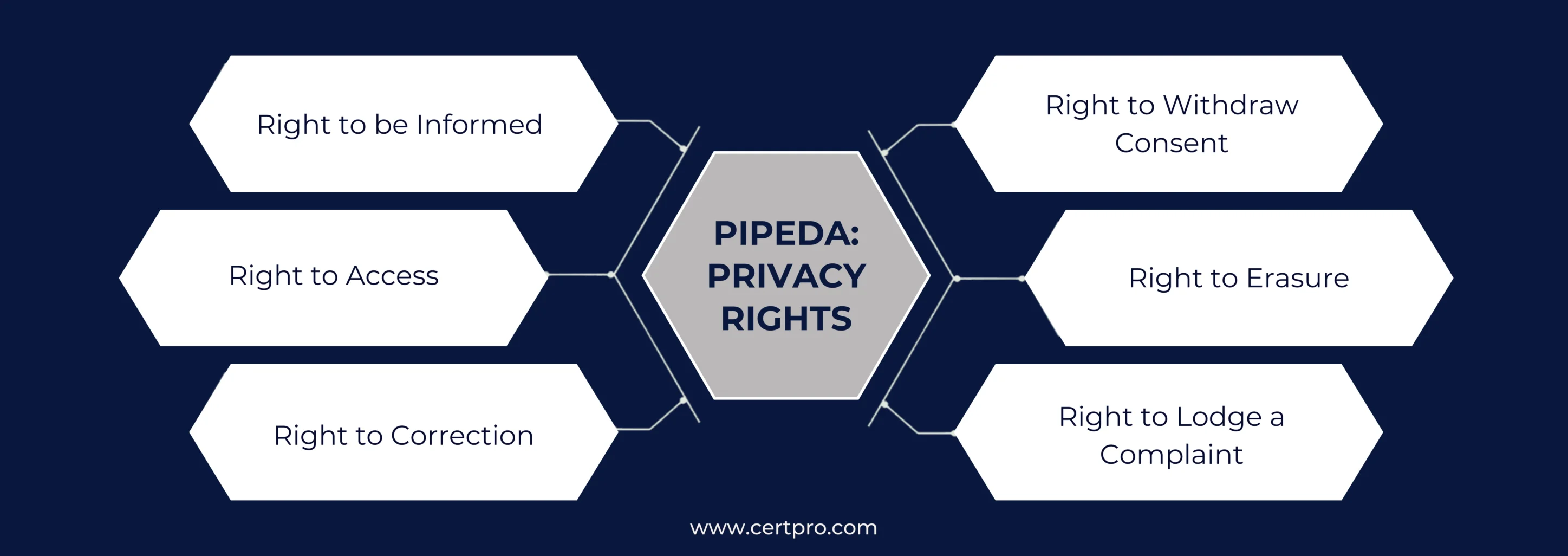
HOW TO GET PIPEDA CERTIFICATION
As a company grows, PIPEDA compliance can become complex. Different regions may have other laws, too. Companies must understand these regional regulations and improve their processes to ensure compliance. Knowing the rules is essential, but companies should also create systematic data management processes that follow PIPEDA principles. This ensures compliance with both current and future mandates.
To achieve PIPEDA compliance, here are some steps:
Display a Compliant Privacy Policy: Displaying a compliant privacy policy is critical. It should clearly outline how user information is collected, used, and disclosed. The policy must be understandable, accessible, and regularly updated.
Invest in Data Governance: Invest in data governance to ensure data privacy, accuracy, security, and usability. Strong data governance measures protect personal information and prevent breaches.
Ensure Strong Security Protocols: Implement robust security protocols. Evaluate and optimize security measures to protect against data breaches. Use reliable security applications and services.
Establish a Data Breach Response Process: Develop a clear plan to respond to data breaches. This helps mitigate negative consequences and ensures prompt actions when needed.
Maintaining Trained and Prepared Employees: Train employees to recognize and mitigate data breach risks, such as phishing. Ensure they know how to handle personal information securely during transactions.
Maintain Up-to-Date Software and Devices: Regularly update software and devices to prevent data privacy issues. This mitigates vulnerabilities and enhances data protection.
Maintaining Preparedness for Audits: Organize and make relevant information available for audits. Use data discovery platforms to identify, classify, and monitor sensitive data. This helps implement security measures and improve compliance processes.
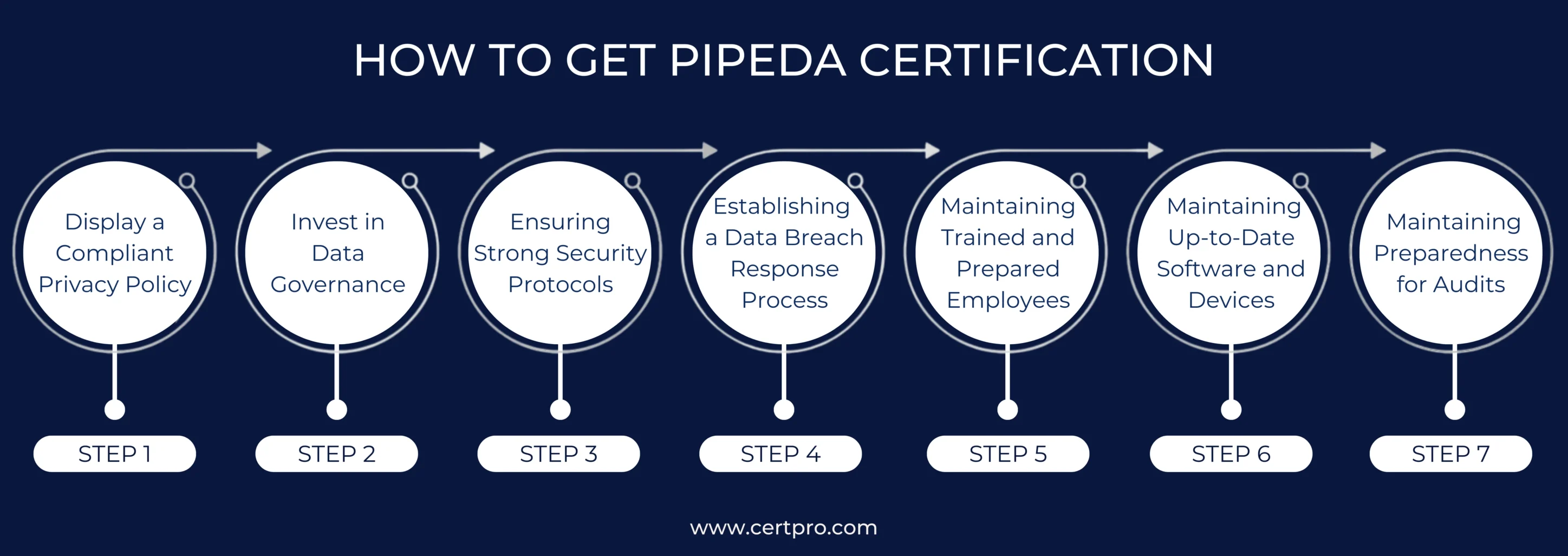
THE REQUIREMENTS OF PIPEDA COMPLIANCE
Under PIPEDA, organizations have rules for handling personal information. These PIPEDA requirements include:
Obtaining Consent: Organizations need explicit consent before using personal information. They must explain why they need it.
Limiting Use, Collection, and Disclosure: Organizations can only use personal info for specific reasons. If they want to use it differently, they need consent again.
Ensuring Accuracy: Organizations must keep personal info accurate and up-to-date.
Retention: They should only keep personal info for as long as needed.
Safeguarding Personal Information: Organizations must protect personal info from unauthorized access.
Providing Access: People can ask for their info and how it’s used.
Allowing Individuals to Challenge: People can question the accuracy of their info.
Sensitivity of the Information: Extra protection is needed for sensitive info, like health data.
Responding to Inquiries and Complaints: Organizations must handle privacy inquiries and complaints promptly and effectively.
Therefore, organizations must comply with these PIPEDA requirements. However, non-compliance can lead to penalties and harm to reputation. In severe cases, legal action can occur. Courts can enforce remedies for damage caused by unauthorized access to personal information.
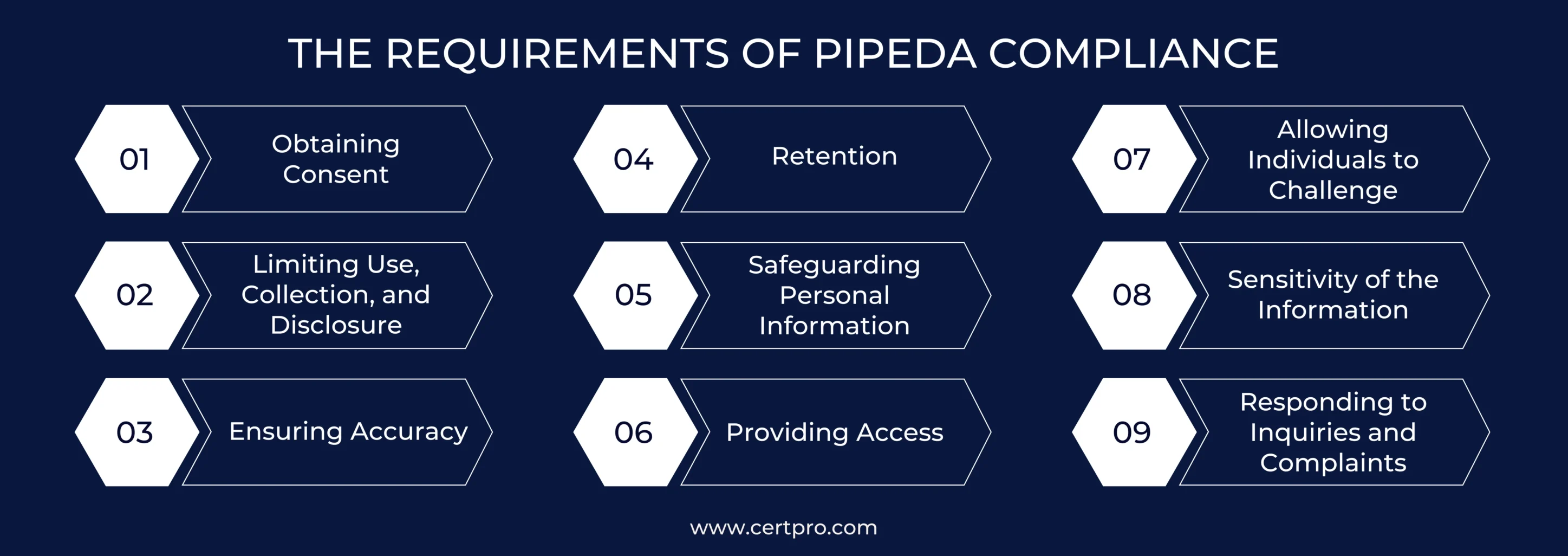
BENEFITS OF PIPEDA COMPLIANCE
Compliance with PIPEDA offers many benefits for organizations in Canada. Here are the key advantages:
Legal Compliance: Following PIPEDA ensures organizations meet legal requirements. This helps avoid penalties and legal issues.
Customer Trust and Confidence: PIPEDA compliance is committed to protecting personal information. It builds trust and confidence among customers.
Enhanced Reputation: Being PIPEDA-compliant improves an organization’s reputation. It shows dedication to privacy and data protection. This can lead to positive word-of-mouth and attract new customers.
Competitive Advantage: PIPEDA compliance gives a competitive edge. Customers prioritize privacy. They prefer compliant organizations. Similarly, business partners favor compliance.
Risk Mitigation: Compliance decreases the risks of breaches. It prevents unauthorized access. Security measures avoid financial losses and prevent legal penalties.
Increased Data Accuracy: PIPEDA mandates accurate personal information maintenance, which ensures better decision-making and improves customer service quality.
Transparent Data Practices: PIPEDA stresses transparency in data practices. Clear policies and consent foster trust, enabling customers to make informed decisions.
International Data Transfers: The compliance aids cross-border data flow. Meeting its standards benefits international partnerships.
Employee Privacy: PIPEDA compliance involves safeguarding employee data. Therefore, this demonstrates a commitment to privacy.
Overall, complying with PIPEDA brings legal, reputational, and operational benefits. It promotes trust, accuracy, and risk management in data handling.
ELIGIBILITY FOR PIPEDA COMPLIANCE
Organizations must meet specific requirements to qualify for PIPEDA compliance. PIPEDA applies to entities collecting, using, or disclosing personal information for commercial purposes. Consequently, this includes foreign organizations handling the personal information of Canadian citizens for commercial reasons. Therefore, federal government entities listed under the Privacy Act, provincial and territory governments, not-for-profit organizations, political parties, charitable organizations, hospitals, schools, universities, and municipalities are among the organizations exempt from PIPEDA compliance.
Furthermore, eligibility may change based on the location of the processing of personal data. Certain provinces may have privacy laws that exempt companies from complying with PIPEDA. However, organizations must comprehend these requirements to assess their eligibility and PIPEDA duties.
THE COST OF PIPEDA COMPLIANCE
The cost of PIPEDA compliance can differ. It depends on several factors, including the audit’s scope, involved business applications, used technology platforms, locations, and extra services needed. Consequently, expenses linked to PIPEDA compliance cover various aspects. They include conducting audits, implementing privacy policies, enhancing data security, training staff, and setting up complaint-handling mechanisms.
Organizations may also need to invest in encryption technology, breach response procedures, and data protection systems. Consequently, expenses could also result from employing lawyers or privacy advisors to ensure compliance. The price of complying with PIPEDA differs because every firm has various requirements. It is customized to their unique situation and the actions necessary to fulfill the legal requirements.
CERTPRO’S SUPPORT IN ACHIEVING PIPEDA COMPLIANCE FOR YOUR BUSINESS
CertPro offers assistance to ensure your business’s PIPEDA compliance. We provide comprehensive auditing and consulting services. Our skilled team assesses privacy practices, finds gaps, and guides the implementation of needed measures. As a result, CertPro aids in creating and applying privacy policies, procedures, and controls. We also conduct privacy impact assessments.
Additionally, CertPro provides staff training to ensure they understand and follow privacy policies. Partnering with CertPro helps enhance personal information protection, ensure transparency, and demonstrate compliance. Our services assist in navigating PIPEDA complexities, building trust, and meeting privacy protection standards. Furthermore, CertPro keeps your business updated with the latest PIPEDA compliance requirements and best practices. This ongoing support ensures your business adapts to any regulatory changes.
FAQ’s
WHAT IS THE ROLE OF CONSENT UNDER PIPEDA?
HOW DOES PIPEDA DEFINE PERSONAL INFORMATION?
WHAT ARE THE CONSEQUENCES OF NON-COMPLIANCE WITH PIPEDA?
ARE THERE ANY EXEMPTIONS OR EXCEPTIONS UNDER PIPEDA?
DOES PIPEDA HAVE AN EXPIRATION DATE?
IT COMPLIANCE IN 2024: ESSENTIAL TRENDS AND BEST PRACTICES
IT compliance is essential for every organization to secure the integrity and accountability of data. The process also helps develop the business and enhance its profitability. In today’s digital era, IT compliance has more than just a regulatory checkbox. It plays a...
POLICY MANAGEMENT SYSTEM: ESSENTIAL TOOLS FOR AUTOMATION AND SIMPLIFICATION
Growing businesses indicates that you become a master in your field and accurately manage all business-related policies. However, managing company policies can be daunting significantly when your business expands. Here, an effective policy management system can help...
NAVIGATING DATA PRIVACY FRAMEWORKS: A COMPREHENSIVE GUIDE
Globalization has intense effects on business functioning and scaling. In today's digital world, companies are generating an unprecedented rate of data that requires protection from emerging cyber threats. In addition, recurring data breaches and privacy concerns make...

